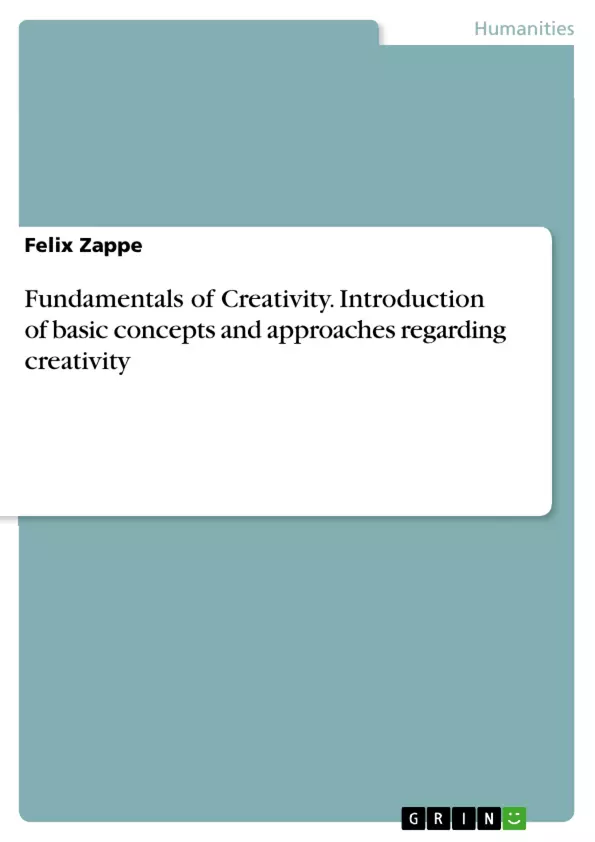In regard of creativity in various scientific disciplines, there are plenty approaches and theories, each adding new dimensions, meanings of the term creativity or perspectives on the creativity approach towards the discussion, what creativity is, how it can be approached, measured and enhanced (von Wissel, 2012). The individual theories differ in different dimensions, e.g. focusing on creative geniuses and everyday creativity or paying attention to different aspects of creativity (for example the 4 Ps) in particular (Kozbelt, Beghetto and Runco, 2010).
However, for the sake of complexity reduction and the forced investigation of psychological issues regarding creativity, especially concepts of the field of psychology should be taken in regard for this work. Namely the authors deal with three concepts of creativity that shaped the psychological discussion around it for the last years and can add to the foundations of their own research.
[...]
Inhaltsverzeichnis (Table of Contents)
- Fundamentals of Creativity
Zielsetzung und Themenschwerpunkte (Objectives and Key Themes)
This paper aims to provide a foundational understanding of creativity by exploring key psychological theories. It examines existing models and concepts to analyze the factors contributing to creative thinking and behavior.
- Different theoretical approaches to creativity
- The role of psychological factors in creativity
- The interplay of individual, domain, and field in the creative process
- Personality traits associated with creativity
- Intrinsic motivation and its influence on creativity
Zusammenfassung der Kapitel (Chapter Summaries)
Fundamentals of Creativity: This chapter delves into various theoretical perspectives on creativity across different scientific disciplines. It highlights the complexities and diverse interpretations of the term "creativity," examining how it's approached, measured, and enhanced. The chapter focuses on three key psychological concepts: Sternberg and Lubart's investment theory, emphasizing the decision-making aspect of creativity and its analogy to economic principles; Amabile's componential theory, which posits that creativity arises from the interplay of domain-relevant skills, creativity-relevant processes, and task motivation; and Csikszentmihalyi's systems model, highlighting the crucial interactions between the individual, the domain (subject area), and the field (evaluative group) in the creative process. These models offer different lenses for understanding the multifaceted nature of creativity, emphasizing the interplay of individual characteristics, cognitive processes, and environmental factors. The chapter also briefly touches upon research into personality traits associated with creativity, connecting these to the previously discussed theories and highlighting ongoing debates and research questions within the psychological community.
Schlüsselwörter (Keywords)
Creativity, psychological theories, investment theory, componential theory, systems model, intrinsic motivation, personality traits, domain-relevant skills, creativity-relevant processes, task motivation, individual, domain, field.
Frequently Asked Questions: Comprehensive Language Preview on Creativity
What is the purpose of this document?
This document provides a comprehensive preview of a paper focusing on the fundamentals of creativity. It includes the table of contents, objectives, key themes, chapter summaries, and keywords.
What are the main objectives and key themes explored in the paper?
The paper aims to provide a foundational understanding of creativity by exploring key psychological theories. It examines different theoretical approaches to creativity, the role of psychological factors, the interplay of individual, domain, and field in the creative process, personality traits associated with creativity, and the influence of intrinsic motivation.
What are the key psychological theories discussed?
The paper primarily focuses on three key psychological theories: Sternberg and Lubart's investment theory, Amabile's componential theory, and Csikszentmihalyi's systems model. These theories offer different perspectives on the multifaceted nature of creativity, emphasizing the interplay of individual characteristics, cognitive processes, and environmental factors.
What does Sternberg and Lubart's investment theory emphasize?
Sternberg and Lubart's investment theory emphasizes the decision-making aspect of creativity, drawing an analogy to economic principles.
What is the central idea of Amabile's componential theory?
Amabile's componential theory posits that creativity arises from the interplay of domain-relevant skills, creativity-relevant processes, and task motivation.
What does Csikszentmihalyi's systems model highlight?
Csikszentmihalyi's systems model highlights the crucial interactions between the individual, the domain (subject area), and the field (evaluative group) in the creative process.
What other factors are considered in relation to creativity?
The paper also discusses the role of personality traits and intrinsic motivation in influencing creativity.
What is included in the chapter summaries?
The chapter summaries provide detailed overviews of the content covered in each chapter, particularly focusing on the theoretical perspectives and models discussed within the "Fundamentals of Creativity" chapter.
What are the key words associated with this paper?
Key words include: Creativity, psychological theories, investment theory, componential theory, systems model, intrinsic motivation, personality traits, domain-relevant skills, creativity-relevant processes, task motivation, individual, domain, field.
What is the overall structure of the preview?
The preview is structured to provide a concise overview, including a table of contents, objectives and key themes, chapter summaries, and keywords, allowing for a quick understanding of the paper's content and focus.
- Quote paper
- Felix Zappe (Author), 2017, Fundamentals of Creativity. Introduction of basic concepts and approaches regarding creativity, Munich, GRIN Verlag, https://www.grin.com/document/358398



